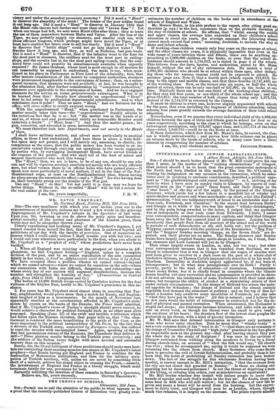THE CENSIIS OF SCHOOLS.
Gloucester, 22d Tune. Snt—Permit me to call the attention of the public to what appears to be a proof that the recently-published Census of Education very greatly over-
estimates the number of children on the books and in attendance at the schools of England and Wales.
Mr. Horace Mann, in his able preface to the report, after citing good au- thorities (p. xxx.) to the fact, comments thus on the probable duration of the stay of children at school. He affirms, that "whilst among the middle and upper classes, the average time expended on theirchildren's school education is about six years, the average amongst the labouring °lasses cannot much exceed four years," meaning, doubtless, to include the stay at dame and infant schools.
If working-class children remain only four years on the average at school, and the other classes six years, it is physically impossible that even in the wide range of years between three and fifteen, there can be anything ap- proaching to 2,000,000 children on the books, or even that the actual at-, tendance should amount to 1,754,812, as is stated in page 4 of the return, This follows from the facts, figures, and authorities, stated by Mr. Mann himself, without the aid of any extraneous data. He makes a total of 3,663,261 children who should be at school within these ages, after deduct- ing those who for various reasons could not be expected to attend. He assumes (page xxx. Note 2) that a fourth part (which equals 915,815) be- long to the upper and middle classes, and that three-fourths (2,747,446) are of the working class. Now, as the former stay six years, or half the whole period at school, there can be only one-half or 457,907, on the books at one ; time. Similarly there can be but one-third of the working-class children ; ; for they stay but four years, or one-third of the whole school age ; and this gives 915,815: the total number of both classes thus being only 1,373,722, instead of the 2,144,378 as returned by the Census. IIt must be obvious to every one, however slightly acquainted with schools for the poor, that even including the fragment of children attending infant schools, four years greatly exceeds the average duration of their total school education.
Nevertheless, even if we assume that every individual child of the 4,908,696 children between the ages of three and fifteen goes to school for four or six years respectively, according to the class to which he belongs, even on that extravagant assumption, only 613,587 upper class, and 1,227,174 of the lower class—total, 1,840,761—could be on the books at once.
If these deductions, which flow from Mr. Mann's data, be correct, the Cen- sus is wholly untrustworthy ; and proves how little reliance can be placed on returns made by the heads of schools, who in many cases have a direct interest in exaggerating the number of scholars.
I am, Sir, your obedient servant, JELINCIER SYMONS.


































 Previous page
Previous page